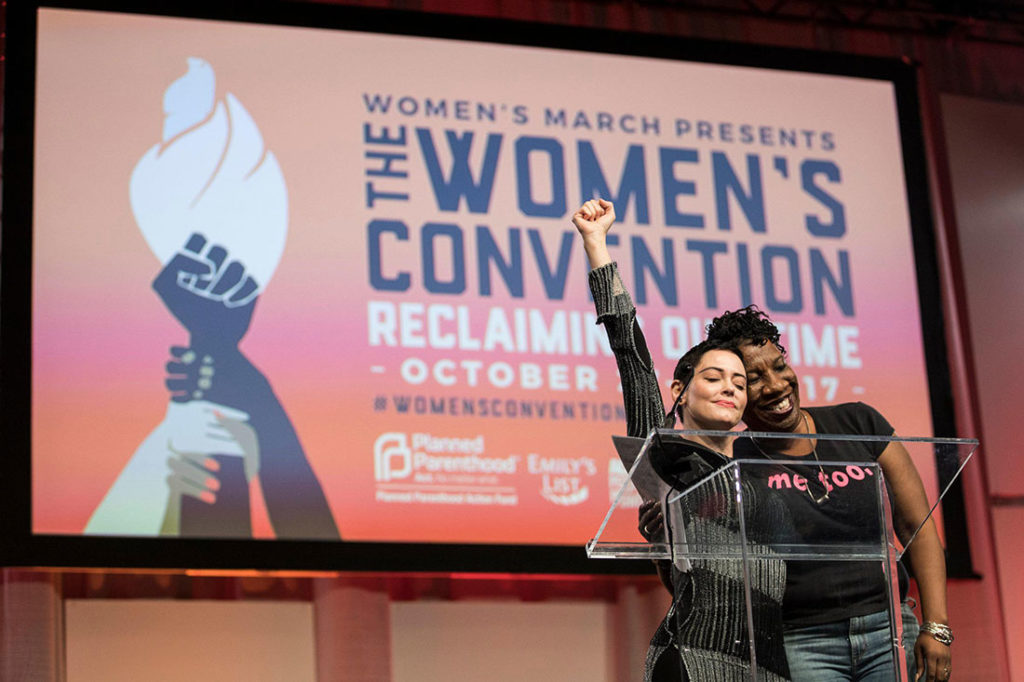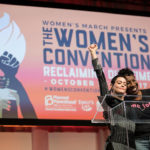Tarana Burke is busy these days. The founder of the Me Too movement is juggling press requests, international travel, and creating a safe and nurturing space for those of which the movement was founded.
Her work around sexual violence has given many the courage and confidence to shed their shame, share their painful experiences, and express their outrage and frustration at a system that has ignored their stories or tried to silence them altogether.
And although Burke says she always wanted to be an activist, she never saw herself here, in this space.
“I did not think that my assignment was to do the work of trying to eradicate sexual violence or create healing space and community for survivors of sexual violence,” she says. “That is not what I saw my work as when I set out to do social justice work. That is how the assignment evolved, and it took me some time to accept that.”
A native of the Bronx, New York, Burke came from a family of community servants. Her grandmother was from South Carolina and moved to New York during the Great Depression. She eventually became a trailblazing nurse and married a soldier when he returned from the war. Even with six children, Burke’s grandmother was active in the PTA for each child and was there for all of Burke’s extracurricular activities as well. Her grandmother, Burke says, was a lesson in patience and faith. She was also active and outspoken.
“My grandmother shaped me,” Burke says from her home in Baltimore. “The reason why I open my mouth and speak up is my grandma. The reason why you can’t keep me from going some place, saying a thing, is all my grandmother. This personality is all Willie Mae Burke.”
On the other hand, Burke says her grandfather instilled in her a sense of pride in her history and heritage. He was from the Caribbean Island of St. Kitts and worked for General Motors for nearly four decades. He taught his granddaughter about Black history, gave her books and took her on trips. He “was intentional about how he poured into me,” says Burke, who also took African dance classes and learned Swahili at a young age.
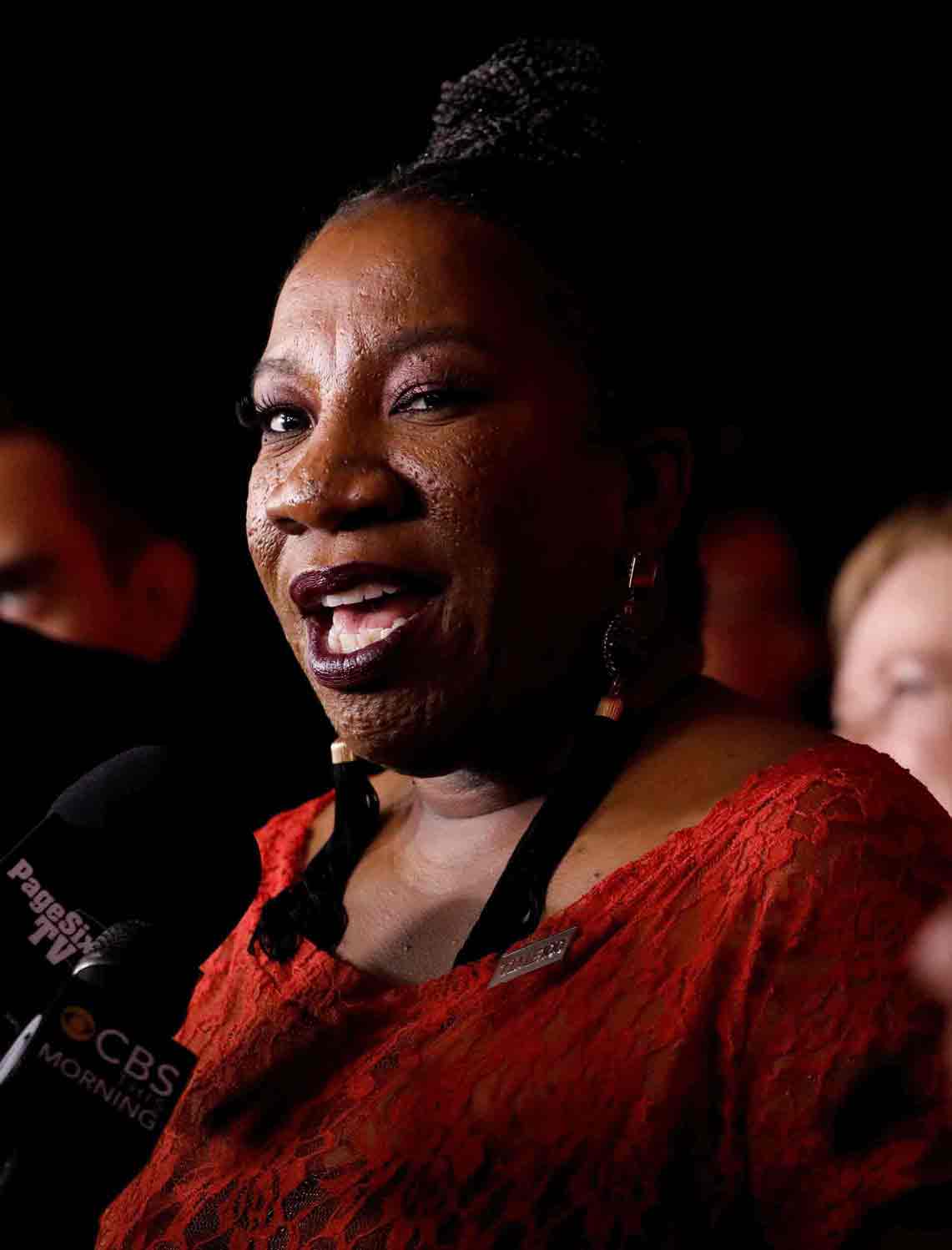
“My grandfather thought it was very, very important to be grounded in history and grounded in the knowledge of who we were and where we came from,” Burke says. “And so, I grew up at a very early age knowing that I was Black and that America did not make space for Black people without a fight. And that it was our job to make space for ourselves, that we were responsible for each other. And that everything that we gained in this country was hard fought for, so that we had to cherish it and that we had to cherish each other.”
Burke’s mother also married a military man. Her stepfather was a cook in the Army and made sure no one in their Bronx community went hungry. He threw block parties for the neighborhood kids and together her parents organized bus rides to amusement parks or gathered youth for picnics. Their home was always open for those who needed a meal—a child home from school, a mother getting off work late.
Growing up in this setting, Burke learned about the importance of community and service. Those are the values that were instilled in her at a young age. But she says one of the most important values she learned was grace. Burke watched her community take care of the formerly incarcerated or those with substance abuse problems.
“You value the people who are around. You don’t throw people away. That’s a value I grew up with,” Burke says. “We don’t give up on our folks. We take care of our folks. We resolve things in love when we can.”
Burke’s childhood was filled with love and joy and family. She excelled in school, was a track star and had perfect attendance. But she also experienced trauma when she was sexually assaulted at the age of 7. From that day forward, she says, her perspective on life changed. She felt unprotected, bad, dirty, ugly.
Years later, this personal pain combined with Burke’s activism would prompt a national movement.
Well before founding Me Too in 2006, Burke went on from childhood to navigate life as a young Black woman—and the negative perceived perceptions that came with that. For example, Burke’s high school guidance counselor assumed she would be a first-generation college student and suggested she attend a community college, despite Burke being in the top percentage of her class and having high SAT scores. And, in fact, she came from a family of college graduates.
Nevertheless, Burke ended up in Alabama, first at Alabama State, a historically Black college in Montgomery, then at Auburn University’s Montgomery campus in 1994. While at Auburn, Burke founded an organization called the African American Student Alliance. The group addressed racism on campus and raised funds to help students pay for fees such as parking tickets and library fines.
“You value the people who are around. You don’t throw people away. That’s a value I grew up with,” Burke says. “We don’t give up on our folks. We take care of our folks. We resolve things in love when we can.”
Burke left Auburn just 2.9 credits shy of graduating after a disagreement with the school. Ironically, in 2019 she was the guest speaker for Auburn’s Extraordinary Women Lecture held at the university’s main campus. The president of the Montgomery campus saw her speech and asked Burke to be the commencement speaker back in Montgomery. He also wanted to present her with the degree she never received from the school—a full-circle moment. Unfortunately, Burke had a conflict out of the country and had to decline the invitation.
After leaving Auburn, Burke stayed in Alabama and worked for a number of nonprofit and civic organizations in Selma. She started an organization to empower young Black girls called Just Be, whose curriculum was eventually taught in some of Selma’s public schools. She was also the managing director of the National Voting Rights Museum and helped organize the Annual Selma Bridge Crossing Jubilee.
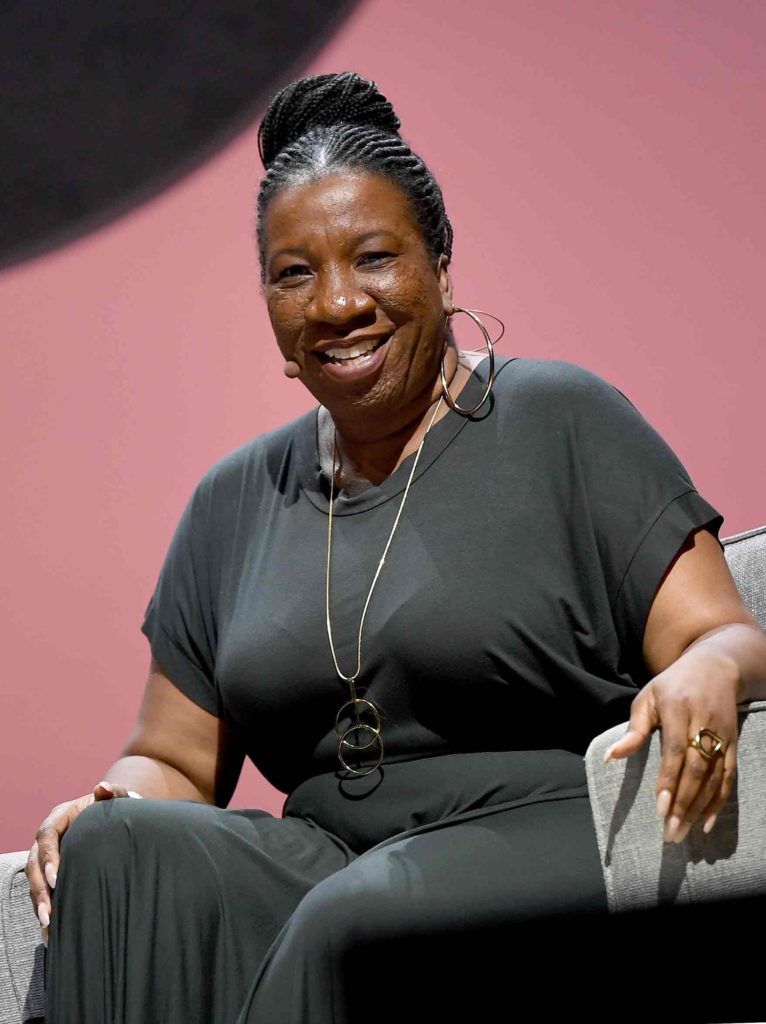
Eventually, some of the young girls Burke worked with in Selma began to confide in her about sexual harm. As a victim of sexual assault at a young age, Burke related to their hurt and confusion. It was then that Burke noticed a deficit of resources in the community, something to help these youth deal with their pain. Yet she still didn’t see this as part of her plan. “There was a need to fill that gap,” she says. “It was a gap that I did not intend to fill.”
But by 2006, she had created Me Too, she says, “for little Black girls like me.”
More than a decade later, the Me Too movement grew to national heights after a tweet by actress Alyssa Milano. Along the way, it took on a life of its own—and the original mission got lost in the hoopla.
Since 2017, a number of powerful, and even not so powerful, men from all walks of life—media to politics, corporate America to sports, music to Hollywood—have been called to task for bad behavior: Harvey Weinstein and Bill Cosby, R. Kelly and Russell Simmons, Matt Lauer and Bill O’Reilly, and Democratic senator Al Franken from Minnesota.
But Burke doesn’t see someone resigning or going to prison as a measure of the movement’s success. Her goal isn’t to tally wins and losses, she says. Instead, she focuses on the things that the Me Too movement have made possible: the 12 million people who have felt empowered to tell their story, the news stories focused on sexual violence, the policy discussions and legislation that were created, and the major research that has been conducted because of the movement. The things that are irreversible.
“Five years ago, we could not have public discourse about sexual violence in the way that we have it now,” Burke says. “Those other things [resignations, incarceration] will come and go. The taste for this will come and go. But there are some things that we have made possible that I’m quite proud of. I choose to focus there.”
Ultimately, the Me Too movement is about creating community for survivors, providing resources for survivors and eradicating sexual violence, Burke says. She emphasizes that the movement centers on Black and Brown women, girls, and queer and nonbinary folks—but not to the exclusion of anybody else—because “those are the first people that will be left out, that will be trampled on, that will be pushed to the side.”
She sees how it has been misinterpreted as a women’s movement, but Burke is clear that Me Too is universal. It’s for everybody. Men’s first roles in the movement are as survivors, she says. Men have fewer spaces, fewer outlets, fewer organizations, fewer resources. And although Me Too has emboldened some women, some men have felt attacked and scared.
“We cannot talk about sexual violence in a binary [way],” Burke says. “We have to do something to shift that narrative or else it’ll continue to be cast as a gender war, and that does nothing to advance our work.”
“Five years ago, we could not have public discourse about sexual violence in the way that we have it now,” Burke says. “Those other things [resignations, incarceration] will come and go. The taste for this will come and go. But there are some things that we have made possible that I’m quite proud of. I choose to focus there.”
Those who have not experienced sexual violence don’t understand the “lift” it takes for someone to share a part of themselves, Burke adds. And what gets lost in the noise about a gender war is the conversation about healing.
This is the focus of the Me Too Movement—of healing, of support and of reshaping the narrative around sexual violence—not Harvey or Bill or anyone else.
Every 67 seconds there is another survivor of sexual violence in this country, Burke notes. That’s a little more than one a minute. “We want people to understand the breadth and depth of survival and survivorship,” she says, “and to understand that this is a social justice movement.”
As a result, Me Too International created the Survivor Sanctuary, a self-guided platform that allows survivors of sexual violence to learn about healing resources at their own pace. The organization is also working with the Global Fund for Women to build a global network focused on working with countries to create a grassroots movement around sexual violence. And Burke points to the Me Too app, a platform in which people can find ways in their own communities to be part of the movement.
In writing about Burke for the Time 100 list in 2018, actress Gabrielle Union noted: “You want a leader who truly believes in inclusivity. For Tarana, it’s not about personal gain or attention but doing the work in a way that makes people feel like they can join in.”
This fall, the organization will celebrate the fifth anniversary of the Me Too hashtag that went viral in 2017. And Burke remains steadfast in the movement’s goal to greatly reduce and end sexual violence.
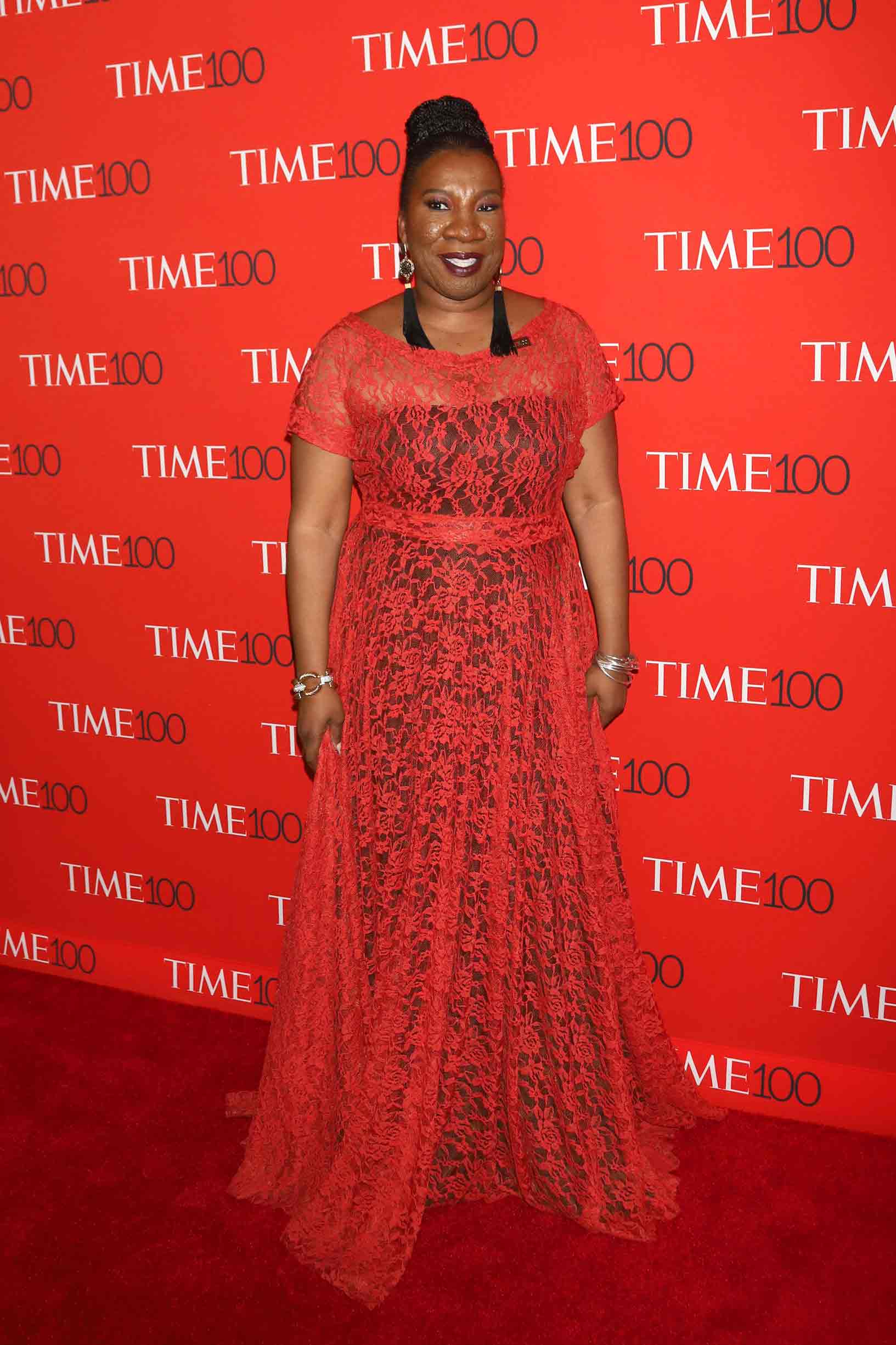
Brené Brown, the best-selling author, podcast host, vulnerability expert and Burke’s co-editor on the anthology You Are Your Best Thing: Vulnerability, Shame Resilience, and the Black Experience, added this to say about her colleague’s impact: “Tarana’s work changed the way we think and talk about sexual assault and gave us guidance on how to build systems that are built on empathy. Under that—and the piece that I believe has really changed the world—is her unswerving commitment to centering survivors, centering love and centering healing.”
It’s this focus that has kept Burke grounded in her mission. Despite all the accolades—all the hoopla—she’s about the work of healing and serving her community.
You could say Tarana Burke was born for this.
For more information on activities around the fifth anniversary of the Me Too hashtag, sign up for the Me Too newsletter at metoomvmt.org.
This article originally appeared in the July/August 2022 Issue of SUCCESS magazine. Photos by ©Demarquis McDaniels and REUTERS/Alamy Stock Photo.



